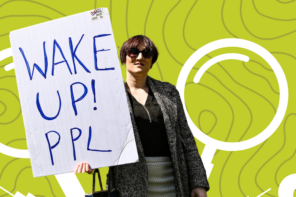As usual, PRRI’s 2022 American Values Survey, released this morning, is chock full of interesting data points about the state of the nation and how it sees itself, from views on abortion and LGBTQ rights to QAnon and immigration. The good news, such as it is, to come from this report is that Americans agree on social issues more than might be suspected. There are nuances, to be sure, and the picture is muddied on some fronts, but overall Americans know what they think.
The more difficult news is that there is a consistent minority opinion in hard opposition to the majority, and seemingly determined to impose its views on the rest of the nation. Longtime RD readers will not be surprised to hear that White evangelical Christians make up the core of that minority.
Consider these data points, for example:
- A whopping 92% of respondents believe that schools should teach American history honestly, even if it makes students “feel uncomfortable or guilty about what their ancestors did in the past.”
- 79% want birth control to remain legal. 75% oppose laws making it illegal to cross state lines to get an abortion.
- 76% support non-discrimination laws to protect the GLBT community.
- 62% think abortion should be legal in most or all cases, and 61% oppose the Dobbs ruling that struck down Roe v. Wade.
Turning things around to look at positions very much in the minority is equally revealing:
- 42% of Americans think that society has become “too soft and feminine.”
- 40% believe that newcomers pose a threat to American society
- 31% think that “God intended America to be a new promised land where European Christians could create a society that could be an example to the rest of the world.”
- 28% believe the “Big Lie” that the 2020 election was stolen from former president Donald Trump.
- 19% can be termed “QAnon believers,” meaning they embrace the three central conspiracy theories driving the movement.
- Just 8% of respondents believe that abortion should be illegal in all cases. That’s a remarkable decline from the previous highwater mark of 19% set in 2014.
It would seem that there is an American consensus on social issues, then, and it’s mostly a liberal one. But that’s not always the case. 68% believe that contemporary citizens bear little or no responsibility for American slavery or its continued effects; while 62% believe that there are only two genders—although many don’t have strong opinions on the subject.
And there are a few surprises in the data. For example, 24% of all respondents say they would only vote for a candidate who agrees with their position on abortion. But of those, 27% are in favor of reproductive rights, while 22% are opposed.
There were also some mixed views on some issues, particularly around voting. Republicans, motivated by issues such as the cost of living, immigration, and crime, are somewhat more likely to be excited about voting (67%) than Democrats (64%), but significantly more likely to be “very excited” than Dems (41-33).
Democrats seem to be motivated this election season primarily by issues like preserving American democracy, abortion, guns, and climate change. While 67% of all those surveyed say they’re motivated to vote by the repeal of Roe, the issue only came in fifth on the list of critical issues for voters, after inflation, immigration, crime and the health of the democracy.
The mixed messages continue on some social issues:
- 45% of respondents agree that the legacy of slavery makes it more difficult for African Americans to escape poverty today, while 51% disagree.
- The surveyed support restrictive bathroom regulations for transgender individuals by an 8-point margin, 52-44, even as they oppose laws banning medical care for gender transition among children.
- 48% disagree with the statement “the American way of life needs to be protected from foreign influence,” while 47% agree.
Sticking out like a sore thumb on these measures, as is often the case, are White evangelical Christians:
- 50% believe that America was founded as a Christian nation
- 65% see immigration as a threat to society
- 61% believe society has become too feminine
- 37% oppose overturning Roe v. Wade
- 19% agree with the idea that the legacy of slavery makes upward mobility harder for African Americans.
On issue after issue, White evangelicals skew to the Right. Sometimes, they’re followed closely by White mainline Protestants or White Catholics, but more often than not, they’re quite distinct from other religious groups. It’s hard to disagree with PRRI president Robert P. Jones when he says, “The survey shows a hardening rightward stance among Republicans, anchored by a white evangelical base, which is increasingly out of step with the values of most other Americans.”
While White evangelicals unsurprisingly find themselves at the opposite end of the scale as religiously unaffiliated citizens, the most striking contrast may be between White evangelicals and younger respondents, who are much more likely to embrace reproductive rights, multiple genders, the freedom to use one’s chosen bathroom, and a pathway to citizenship for undocumented residents brought to the US as children. Perhaps not surprisingly, those younger voters tend to be less religious than older members of society.
In fact, this edition of the American Values Survey could be used as pretty good evidence for the proposition that there’s a reciprocal relationship between conservatism and religious disaffiliation. Young people depart religious institutions in part because of disagreements with older generations about sexuality and reproduction, or they never bother to affiliate with them in the first place. The institutions they leave behind are filled with older, less educated, and more conservative members.
This is of course very nearly the reverse of the theory that liberalism emptied the pews of the mainline churches, popular since the 1970s. The data in this survey ought to put to rest the noxious fiction that being to the Left of center killed American Christianity (a fiction historian David Hollinger challenges in his forthcoming book covered here on RD).
But there’s more to the story. Again and again, what we see in the responses is a willingness on the part of White evangelicals to embrace whatever bogeyman the Republican party throws their way. It could be immigrants, transgender individuals, educators, proponents of critical race theory, supposedly ineligible people voting, irresponsible Black people, or women able to exercise sexual agency without fear of repercussions. Whoever they are, White evangelicals appear to have decided that they’re a threat to the safe and decent functioning of American society, and the GOP is more than happy to stoke those sentiments for its political benefit.
Fear works, in other words, which is why Republican advertising this cycle has been filled with inflation, crime, immigration and anti-transgender moral panic. It’s a strategy designed to turn out the conservative base; which is to say, White evangelical Christians, in large part.
To flip things around again, it’s helpful to understand White evangelicalism not just as a religious demographic that’s becoming ever more conservative, but as the religious demographic of choice for many of the more reactionary elements of the political landscape.
That choice is shaped by a shared information landscape that’s relentlessly sealed off from outside influence. The people who get their news primarily from conservative news outlets are far more likely to reject the possibility of a diverse, multiracial, multiethnic, democracy, by the evidence of the American Values Survey.
And White evangelicals, with their predilection for “Christian” media, pioneered and continue to embrace the reality constructed by outlets like OAN, Infowars, The Christian Post or WorldNetDaily. It now leaves them vulnerable to cynical mutations like the QAnon cult, which has grown alarmingly since 2020.
Even without the embellishments of conservative media, the environment of the past few years has been conducive to the rise of intolerance. It’s been fanned by authoritarian leaders like Trump, and fueled by an unprecedented pandemic and the economic insecurity it caused, among many other factors. In the midst of turbulence, people reach out for clear, simple, and firm answers, exactly the sort of thing you see reflected in the responses to this survey.
To come back to where we began, then, the good news here is that most people in the US share a more-or-less tolerant perspective on social issues—and to a lesser extent, on racial questions. The bad news is, the people who aren’t on board with that perspective not only make up a significant part of the population, but they’re very fired up and in just under two weeks they could very well ride a wave of dissatisfaction with the economy to control vast portions of American government on all levels.





